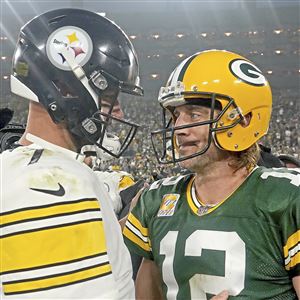BREAKING NEWS (sort of): Cinderella has already been cast out of the tournament, if by Cinderella you mean Team Israel and by the tournament you mean the World Baseball Classic, both of which I do.
Don’t talk to me about your UC Davis Doormats or your Texas Southern Comforters or whatever college basketball pretender you’re trying to coax through the gathering madness. They are mere ugly stepsisters on the fairy tale continuum of out-of-place participants compared to Team Israel, which, in case you ignored it, mounted a fairly astounding insurgence into international baseball politics.
“We knew how we were being looked at,” said former Pitt pitching star Corey Baker from a Tokyo hotel room this week. “But we also knew that we were better than a lot of people thought. Israel had never qualified for this tournament and none of us had ever played in it. I guess if you told us we’d go 3-0 in the first pool, we’d definitely
have signed up for that.
“But we’re not satisfied. Our goal is to get to the final round.”
The dream endured until the sixth inning that night against Japan, when hulking left-handed thumper Yoshitomo Tsutsugoh launched a baseball 450 feet to ignite a five-run rally and ultimately an 8-3 victory by the hosts on the Pacific rim.
It was a stunning dismissal for an Israeli team that had, amidst its accomplishments, drawn remarkable momentum from baseball’s most unusual mascot, the life-sized, stuffed, talismanic Mensch on the Bench.
How could I make that up?
“He’s a mascot, a friend, a teammate; he’s a borderline deity to our team,” former Padre Cody Decker apparently told a news conference after Israel beat South Korea. “He brings a lot to the table.”
According to ESPN, the worldwide leader in mascot coverage, the players bring a lot to the Mensch as well. As the fictional Cleveland Indians brought offertory rum to the voodoo doll Jobu in the 1989 classic “Major League,” these real life teammates poured the Mensch a glass of Manischewitz before every game, further offering Hanukkah gifts and gefilte fish.
“This thing has been intense, extremely competitive, and (the Mensch) has been fun for our team because it’s kept us loose,” Baker told me. “It started back in Brooklyn when we had a smaller one and we took it everywhere. It’s brought people together and Jewish people all over the world are having fun with it.”
What started back in New York, for Team Israel last September and for Corey Baker from the time he went 20-1 as a teenager over three seasons for the Bayside Yankees, a traveling amateur team, represent parallel baseball odysseys like few others.
Neither seemed destined for one of the sport’s brightest stages.
“Corey was very lightly recruited,” said Pitt coach Joe Jordano, who began his 20th season as the Panthers’ head coach last month. “He wasn’t that big, but we took a shot at him. Every time he got on the mound, he just competed; I mean he was afraid of nobody. He always drew the opponent’s No. 1 guy. He had a great changeup, slider, breaking ball. Had some life to his fastball but it was his breaking stuff that made it look faster.
“When he left, he was our all-time leader in wins with 24.”
In his junior year in Oakland, 2010, Baker was All Big-East and went 11-3 while across town, the Pirates were losing 105 times to nail down the No. 1 pick in the 2011 draft. Gerrit Cole would be that No. 1 pick. Corey Baker would be pick No. 1,490, snatched in the 49th round by the St. Louis Cardinals, who weren’t necessarily thrilled with the 5-plus ERA he posted as a senior.
Still, Baker has steadily worked his way forward in the Cardinals system, splitting last summer between the Double A Springfield (Mo.) Cardinals and the Triple A Memphis Redbirds, to whom he hopes to return this spring.
Half a world away, a man named Peter Kurz was finding himself president of something called the Israeli Association of Baseball.
He had one problem: No players.
OK, actually two; there were two players. The 37-year-old pitcher Schlomo Lipetz and Dean Kremer, a 20-year-old Los Angeles Dodgers minor leaguer, the first Israeli ever drafted by a major league team. Kurz would have to fill out the rest of the roster using the WBC’s heritage rule, which a New York Times piece explained thusly: “A player is eligible to join a team if a player is a citizen of the nation, qualified for citizenship or can hold a passport of that country. A player who has one parent who is, or was, a citizen of that nation, can also join the team.”
In New York looking for players, Kurz told a writer from The Tablet Magazine, “Getting the Cohens and the Goldbergs — that’s the easy part. But to win, we needed to find the other guys.”
As the qualifying tournament loomed, Kurz scrambled for competent components. He could not have Ryan Braun of the Brewers or Alex Bregman of the Astros because in September the major league season was still in progress, but plenty of competitive players lurched into frantic compliance with the heritage rule.
“They needed proof,” Baker remembered. “I was somewhere on the road last summer and I called my parents and said, ‘Hey, we need something to prove this.’ So they sent in this picture of my Bar Mitzvah. It was as Bar Mitzvah a picture as you could imagine. I’m standing with both my parents and I’m holding a Torah! We all have some anecdote like that.”
Kurz told The Tablet interviewer one candidate sent a picture of his grandmother’s grave stone, on which a Star of David was carved. Great, Kurz must have thought, now all I have to do is prove the body in that grave is this guys’ grandmother.
When they all convened, they beat Great Britain, Brazil and Pakistan in the qualifying tournament, with Baker starting and getting the win against Brazil. Team Israel, unofficially the 16th seed, was headed to the 16-team World Baseball Classic.
“It’s an unbelievable experience — really unique, no other baseball setting like it,” Baker said. “The whole offseason was spent looking forward to it and it hasn’t disappointed, to have been in these cities and been exposed to these cultures.”
They started in Seoul, where they took a 2-1 extra-inning verdict from the Koreans, then Baker beat Chinese Taipei with 4 ⅔ strong innings, and a 4-2 win over the Netherlands meant Team Israel would advance to Tokyo. There they beat Cuba to go 4-0, but Baker was slapped around by the Netherlands two days later for the team’s first loss. Japan ejected them early Wednesday.
“This is a great story,” said Jordano. “I have a Team Israel hat in my office. Jonah Rosenthal, who’s now a scout for the Dodgers, was my team manager for four years at Pitt, so I had two connections with that team. And Corey’s such a great kid. You know his father is a TV producer and really good friends with Ted Danson. I’ve got a ball in my office signed, ‘To Coach — Sam Malone. Then, on the other side, Ted Danson.’ ”
Putting aside the inevitable griping, just about everyone even remotely connected with the World Baseball Classic has reveled in the kind of theater that’s elevated the game to another level of passion. The demonstrable joy of the Dominicans when they overturned the 5-0 lead Team USA had erected and the crazed rally of the Venezuelans to flip Italy 11-10 provided jarring tempo changes to the game’s somnambulant spring training pace. Even Team USA, typically stoic if not downright aloof in these matters, erupted in passion the other night when eighth-inning homers by Adam Jones and Eric Hosmer scuttled Venezuela.
Gotta be the heritage thing, right?
“Typically when you think about a team you’re talking about a diverse group and the challenges and opportunities that presents,” Baker said. “But this is unique — we all share something, and it adds up to a different dynamic. I don’t know that it makes the game harder or easier, but look at way the Dominicans play. That pride is really admirable and it’s the same with all these teams. In the big leagues, you just can’t, in reality, play that way every night. You’d never make it through 162 games.”
No, you would not, but it’d be fun to watch while it lasted.
First Published: March 19, 2017, 4:00 a.m.


















